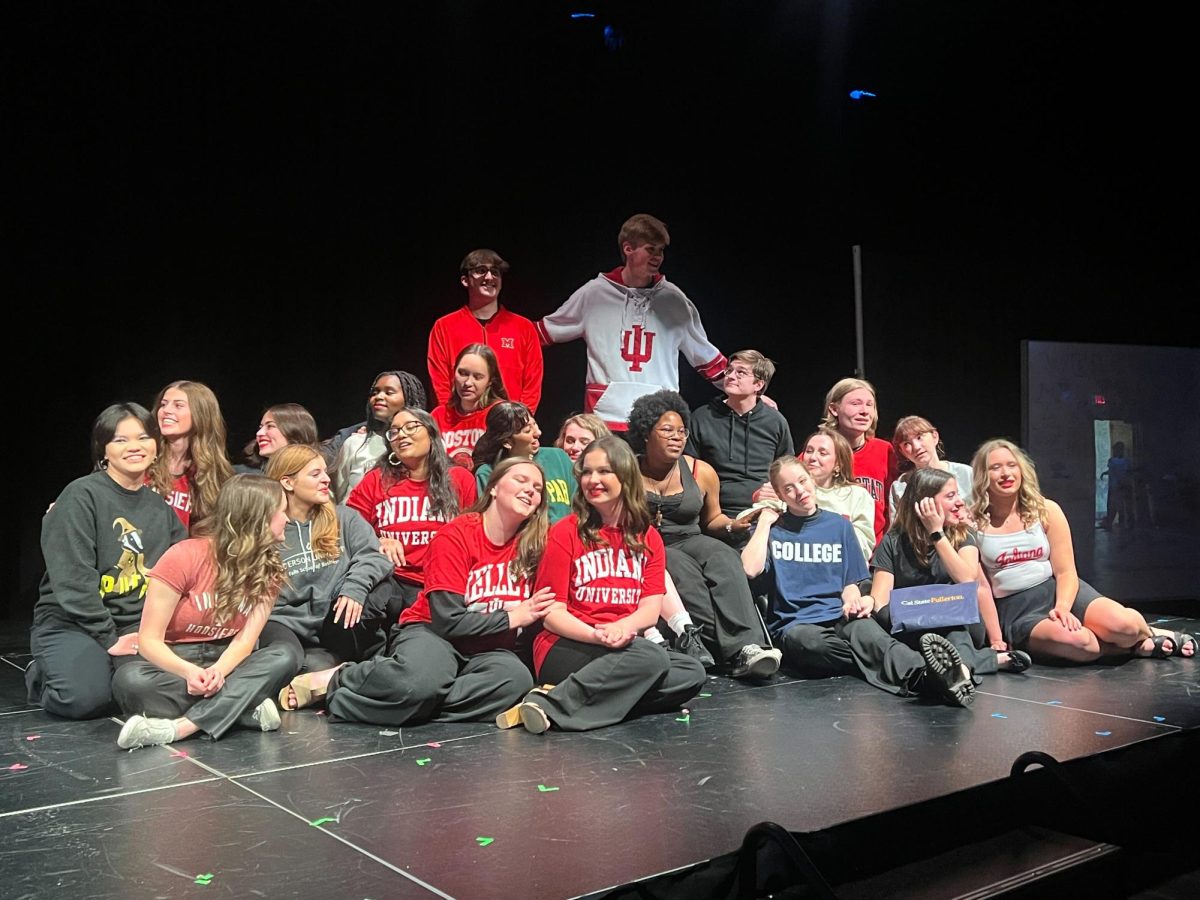By Sara Rogers
<[email protected]>
After more than twelve years in the school system, I can safely say that American education is a far cry from making the grade.
As paradoxical as it may seem, the emphasis schools place on learning has decreased more and more the further I’ve progressed in those schools. Instead of stressing the importance of learning for students’ betterment, teachers, parents and administrators instead drive home the importance of getting a good education as a means of getting into college.
This is not to declare I have learned less throughout high school; my stacks of worksheets, notes, essays and multiple-choice tests suggest otherwise. As finals and college application deadlines creep nearer, however, I have become more aware of and concerned with the overwhelming pressure placed on today’s students to earn high grade point averages rather than actually learning something for enjoyment.
On Dec. 6, theaters began screening “Race to Nowhere,” a documentary focusing on the anxiety facing students in an increasingly fast-paced and competitive academia. The film’s main claim is that standards today encourage students to cram as much into their brains as possible, stretching themselves impossibly thin to appeal to those “higher-beings” who set the bar impossibly high. The taxing, high-achieving precedent ends up eliminating almost all enjoyment from learning.
I can attest to that claim. Just last month, CHS freshmen, sophomores and juniors began planning and scheduling for next year. During one of my classes, a student contemplated discontinuing two courses solely based on the fact that they were worth only the non-weighted maximum of 4.0 rather than the full-weight 5.0. That reasoning is ludicrous.
Students should take AP and honors classes because they are interested in the subject or want a challenge, not to inflate their GPAs. While I disagree with this reasoning, I understand this plight.
The pressure to succeed and go to an esteemed university follows me far beyond the constraints of the CHS building. At a football game this year, my friend introduced me to her friends from the opposing school.
While discussing our plans for next year, another girl mentioned that her top school choice was the same as mine. Immediately, I was on edge. I started comparing myself to her, sizing up my competition in every way possible.
That is not normal behavior. I’m sure many students don’t automatically go on guard at the first sight of a challenger. But I’m also sure I’m not alone. I reminisce about those days when the fiercest school-related competition involved foam dodgeballs in gym class. I remember when a student could earn an “A” through learning the material and retaining it, rather than cramming everything in the night before a test only to forget it 48 hours later. Can I have that education back?
As stress placed upon students escalates, educational reform seems like a necessity. The problem, however, is far from a simple fix. The academic system in America is built upon fostering competition and encouraging students to push just a little harder or study just a little longer to one-up their classmates. I seriously doubt I am the only one who finds it difficult to function at top efficiency when everyone else around me is frantically memorizing formulas, notes and vocabulary words.
With more emphasis placed on grades, cheating has escalated as well. According to a 2009 Rutgers study of 24,000 high school students, 95 percent admitted to cheating, ranging from copying homework to copying tests. The same study also declared that when grades are on the line, students are more likely to perceive cheating as “acceptable and justifiable.”
Another poll, conducted in 2004 by Gallup, asked students to describe how they felt in school in three words. The most common word reported was “bored.” The second word was “tired.” A boring and tiring environment is far from motivating.
However, as troubling as the poll result is, it doesn’t really shock me. Of course, not every class at CHS is monotonous and tiresome. In fact, most of my classes in the last three years have not been that way. While these classes are beneficial, the pressure, especially in more challenging courses, is still very much present in the classroom.
Having said that, no single group is to blame. Teachers stress knowing information for a test. Administrators stress challenging oneself academically through a rigorous schedule. Colleges stress earning high marks through standardized testing and grades. Students stress competing against one another. Pressure pinpoints students from every part of the spectrum, making it impossible to reverse the deep-rooted tension among students in high school.
What “Race to Nowhere” tried to communicate is that money can only do so much to reform schooling in the United States. More so than a change in funding, a change in mind-set is imperative. To truly improve education, the focus must shift back to learning.
Every student should receive an education. Likewise, every student should enjoy doing so. As a country we must bring American education back to the forefront. While we are at it, let’s bring back recess, too.





















































![Review: “Suits” is a perfect blend of legal drama and humor [MUSE]](https://hilite.org/wp-content/uploads/2024/04/unnamed-1.png)
![Chelsea Meng on her Instagram-run bracelet shop [Biz Buzz]](https://hilite.org/wp-content/uploads/2024/04/IMG_2446-1200x838.jpg)
![Review: Quiet on Set: The Dark Side of Kids TV is the long awaited exposé of pedophilia within the children’s entertainment industry [MUSE]](https://hilite.org/wp-content/uploads/2024/04/unnamed.jpg)
![Review: “The Iron Claw” cannot get enough praise [MUSE]](https://hilite.org/wp-content/uploads/2024/04/unnamed.png)
![Review: “The Bear” sets an unbelievably high bar for future comedy shows [MUSE]](https://hilite.org/wp-content/uploads/2024/03/unnamed.png)
![Review in Print: Maripaz Villar brings a delightfully unique style to the world of WEBTOON [MUSE]](https://hilite.org/wp-content/uploads/2023/12/maripazcover-1200x960.jpg)
![Review: “The Sword of Kaigen” is a masterpiece [MUSE]](https://hilite.org/wp-content/uploads/2023/11/Screenshot-2023-11-26-201051.png)
![Review: Gateron Oil Kings, great linear switches, okay price [MUSE]](https://hilite.org/wp-content/uploads/2023/11/Screenshot-2023-11-26-200553.png)
![Review: “A Haunting in Venice” is a significant improvement from other Agatha Christie adaptations [MUSE]](https://hilite.org/wp-content/uploads/2023/11/e7ee2938a6d422669771bce6d8088521.jpg)
![Review: A Thanksgiving story from elementary school, still just as interesting [MUSE]](https://hilite.org/wp-content/uploads/2023/11/Screenshot-2023-11-26-195514-987x1200.png)
![Review: When I Fly Towards You, cute, uplifting youth drama [MUSE]](https://hilite.org/wp-content/uploads/2023/09/When-I-Fly-Towards-You-Chinese-drama.png)
![Postcards from Muse: Hawaii Travel Diary [MUSE]](https://hilite.org/wp-content/uploads/2023/09/My-project-1-1200x1200.jpg)
![Review: Ladybug & Cat Noir: The Movie, departure from original show [MUSE]](https://hilite.org/wp-content/uploads/2023/09/Ladybug__Cat_Noir_-_The_Movie_poster.jpg)
![Review in Print: Hidden Love is the cute, uplifting drama everyone needs [MUSE]](https://hilite.org/wp-content/uploads/2023/09/hiddenlovecover-e1693597208225-1030x1200.png)
![Review in Print: Heartstopper is the heartwarming queer romance we all need [MUSE]](https://hilite.org/wp-content/uploads/2023/08/museheartstoppercover-1200x654.png)























![Review: Ladybug & Cat Noir: The Movie, departure from original show [MUSE]](https://hilite.org/wp-content/uploads/2023/09/Ladybug__Cat_Noir_-_The_Movie_poster-221x300.jpg)

![Review: Next in Fashion season two survives changes, becomes a valuable pop culture artifact [MUSE]](https://hilite.org/wp-content/uploads/2023/03/Screen-Shot-2023-03-09-at-11.05.05-AM-300x214.png)
![Review: Is The Stormlight Archive worth it? [MUSE]](https://hilite.org/wp-content/uploads/2023/10/unnamed-1-184x300.png)

